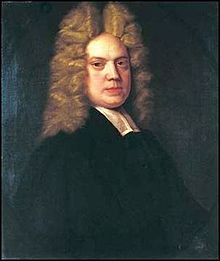Henry Sacheverell

by Thomas Gibson (1710)
Henry Sacheverell (1674 – 15 June 1724) was an English High Church clergyman and politician.
Life
The son of Joshua Sacheverell, rector of St Peter's, Marlborough, he was adopted by his godfather, Edward Hearst, and his wife, and was sent to Magdalen College, Oxford, in 1689. He was a student there until 1701 and a fellow from 1701 to 1713. Joseph Addison, another native of Wiltshire, had entered the same college two years earlier; he later dedicated to Sacheverell his work on English poets (1694). Sacheverell took his degree of B.A. in 1693, and became M.A. in 1695 and D.D. in 1708. His first preferment was the small vicarage of Cannock in Staffordshire; but he came to fame when preacher at St Saviour's, Southwark. His famous sermons on the church in danger from the neglect of the Whig ministry to keep guard over its interests were preached, the one at Derby on 15 August 1709, the other at St Paul's Cathedral on 5 November 1709.
They were immediately reprinted, the latter being dedicated to the lord mayor and the former to the author's kinsman, George Sacheverell, high sheriff of Derby for the year; and, as the passions of the whole British population were at this period keenly exercised between the rival factions of Whig and Tory; Sacheverell's arguments on behalf of the church which supplied the Tories with most of their support made him their idol. The Whig ministry, then slowly but surely losing the support of the country, were divided in opinion as to the propriety of prosecuting this zealous parson. John Somers, Baron Somers was against such a measure; but Sidney Godolphin, who was believed to be personally alluded to in one of these harangues under the nickname of "Volpone," urged the necessity of a prosecution and gained the day.
The trial lasted from 27 February to 21 March 1710 and the verdict was that Sacheverell should be suspended for three years and that the two sermons should be burnt at the Royal Exchange. This was the decree of the state, and it had the effect of making him a martyr in the eyes of the populace and (along with heavy taxes on Londoners) bringing about the first "Sacheverell riots" that year in London and the rest of the country, which included attacks on Presbyterian and other Dissenter places of worship, with some being burned down. The rioting in turn led to the downfall of the ministry later that year and the passing of the Riot Act in 1714. Immediately on the expiration of his sentence (13 April 1713) he was instituted to the valuable rectory of St Andrew's, Holborn, by the new Tory ministry, who despised the author of the sermons, although they dreaded his influence over the mob[citation needed]. Another set of "Sacheverell riots" broke out in 1715. Henry Sacheverell died at the Grove, Highgate, on 15 June 1724.
References
- John Rouse Bloxam, Register of Magdalen and Hill Burton, Queen Anne, vol. ii.
- Hearne, Thomas. Remarks and Collections of Thomas Hearne. Edited by C. E. Doble, D. W. Rannie, and H. E. Salter. Oxford: Printed for the Oxford Historical Society at the Clarendon Press, 1885-1921. 11 volumes.
- There is a bibliography covering the pamphlet battle on both sides by Francis Falconer Madan (Madan, Francis Falconer, 1886-1961) A Critical Bibliography of Dr. Henry Sacheverell. Edited by William Arthur Speck. University of Kansas Publications. Library Series 43. Lawrence KA: University of Kansas Libraries, 1978. Based on his father's (Francis Madan 1851-1935) A Bibliography of Dr. Henry Sacheverell, Oxford: Printed for the Author, 1884, 73 pp., which in turn was a reprinting of the father's series of articles in The Bibliographer, 1883-1884, with additions.) The Madan's collection, upon which much of their work is based, is now in the British Library.
- 'Book 1, Ch. 18: Queen Anne', A New History of London: Including Westminster and Southwark (1773), pp. 288-306. Date accessed: 16 November 2006.
- Geoffrey Holmes, 'The Sacheverell Riots: The Crowd and the Church in Early Eighteenth-Century London', Past and Present, No. 72 (Aug., 1976), pp. 55-85
